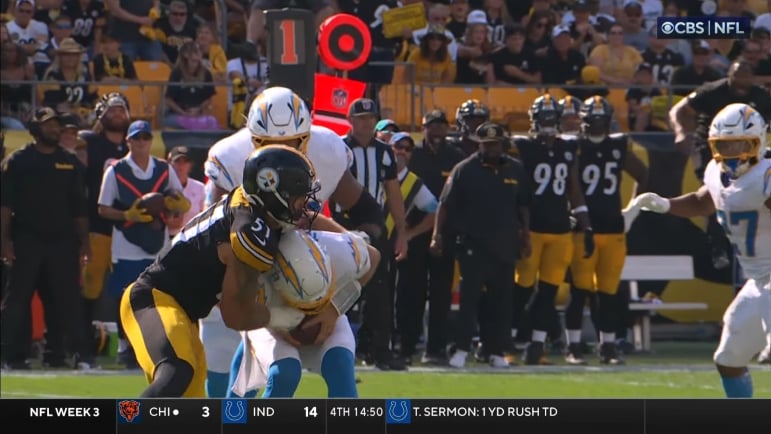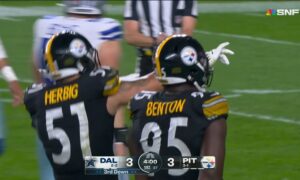Player: OLB Nick Herbig
Stock Value: Stud
Reasoning: Nick Herbig is already off to a strong start in his second NFL season, and perhaps up for his first start. He recorded not one but two sacks against the Chargers yesterday, one a strip-sack. While he didn’t stack the stat sheet in the first two weeks, he showed he can produce at any time.
The first time Nick Herbig’s name came out of the mouth of anybody in the UPMC Rooney Sports Complex in an official capacity, it came from a familiar place. In his introductory press conference, older brother Nate declared him a “stud” as a draft prospect. Little did he know the Steelers would draft him several weeks later.
While he fell into the fourth round due to his size, Nick Herbig is proving older brother right. In under 200 snaps as a rookie last year, he recorded three sacks, two forced fumbles, and five tackles for loss. In his third game of his second season, he posted his first multi-sack game. He recorded two solo sacks, one a strip-sack, which he regrets not recovering, as he did last year.
Herbig received increased playing time yesterday because Alex Highsmith exited the game due to a groin injury. While we don’t know what Highsmith’s status might be next week, Herbig is obviously be in line to start.
The Steelers do not have any other outside linebackers on their 53-man roster behind T.J. Watt, Highsmith, and Herbig. They view Herbig as a part of a three-headed money, and that third head only grew louder yesterday.
In addition to two sacks, Nick Herbig also recorded one other tackle, a run stop. He only had one tackle in his first two games combined, but he also only played 34 snaps. One thing is clear though: he has already proven his value, and the Steelers won’t hesitate to start him. The only concern is who they can get to back him and Watt up should Highsmith miss time.
As the season progresses, Steelers players’ stocks rise and fall. The nature of the evaluation differs with the time of year, with in-season considerations being more often short-term. Considerations in the offseason often have broader implications, particularly when players lose their jobs, or the team signs someone. This time of year is full of transactions, whether minor or major.
A bad game, a new contract, an injury, a promotion—any number of things affect a player’s value. Think of it as a stock on the market, based on speculation. You’ll feel better about a player after a good game, or worse after a bad one. Some stock updates are minor, while others are likely to be quite drastic, so bear in mind the degree. I’ll do my best to explain the nature of that in the reasoning section of each column.






